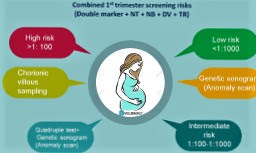What is Double Marker Test?
The Double Marker Test, otherwise called maternal serum screening, is essential for a more complete screening called the principal trimester screening. It is anything but an official exam. All things being equal, it is anything but a prognostic test, which means that its results report the possibility of chromosomal irregularities.
In particular, this test evaluates for blood levels of both free beta-human chorionic gonadotrophin (beta-hCG) and pregnancy-related plasma protein A (PAPP-A).
In a run of the mill pregnancy, there will be either 22 sets of XX chromosomes in female babies or 22 sets of XY chromosomes in male hatchlings.
A trisomy is a chromosomal condition where there are additional chromosomes, like the accompanying:
Down condition. This normal trisomy is additionally alluded to as trisomy 21 on the grounds that there's an additional duplicate of chromosome 21.
Trisomy 18 and trisomy 13. These normal chromosomal anomalies include an additional duplicate of chromosome 18 (Edward's disorder) or chromosome 13 (Patau's condition).
Levels of hCG and PAPP-A might be either higher or lower than "ordinary" in pregnancies with these chromosomal anomalies.
Be that as it may, blood levels alone don't deliver your outcomes. All things being equal, the blood test is utilized alongside a ultrasound called a nuchal clarity (NT) check, which looks at the reasonable tissue at the rear of your child's neck.
Why Double Marker Test is Done?
The main trimester screening — Double Marker Test and NT check — isn't compulsory. All things considered, the screening (and others like the without cell DNA test) is suggested in case you're beyond 35 a years old may have a raised danger of chromosomal issues, for example, in the event that you have a family background of specific conditions.
Recollect that the outcome just reveals to you whether there's an expanded danger of trisomies. It doesn't absolutely decide if your child has any irregularities.
Before choosing whether you need a Double Marker Test, you may want to ask yourself what the result will be for you in the long term.
Will thinking about possible irregularities ease or worsen your discomfort ?
Will you have to go in for invasive testing if you get a result that shows a higher risk ?
Would the outcomes of Double marker test will change the way of dealing with your pregnancy ?
Everything's about close to home decision and your wellbeing history, so there's actually no correct solution to your inquiries.
Timing of the Double Marker Test
There is a moderately thin time window during which the Double Marker Test can be performed. Your medical service provider will have an arrangement right off the bat, closer to the farthest range of your trimester or perhaps in the later trimester.
More obviously, you will have blood drawn at some time between weeks 11 and 14 week of your pregnancy.
Procedure of Double Marker Test
A Double Marker Test is finished with a ultra - sound test and is finished with a blood test. The Double Marker Test searches for two markers specifically Free Beta hCG (human chorionic gonadotrophin) and PAPP – A (Pregnancy related plasma protein A).
Free Beta hCG is a glycoprotein chemical delivered by the placenta during pregnancy. It's undeniable level is demonstrative to a higher danger of Trisomy 18 and Down's condition.
PAPP – A will be a fundamental plasma protein. A low degree of plasma protein is characteristic of the danger of down condition.
The test readings are connoted as far as screen positive, high danger and screen negative.
Cost of the Double Marker Test
While you pay for Double marker test will depend on security coverage and area. While the test discretionary, it may very well be covered as part as of your medical coverage strategy.
call your security supplier to find out your inclusion and whether you need a pre-approval. Then, if you don't have protection, you can call your medical clinic or lab to discover the expense and possible installment plan or discount.
This test is regularly done related to the NT scan, so you'll have to pay for the two tests for the total first trimester screening.
What to expect after getting tested?
The Double marker test is a basic blood test. Your PCP will compose a request for you to take to a lab. It's a non-fasting test, so you may eat or drink typically before your double marker test.
Labs change with respect to turnaround times. Overall, you can expect to accept your results within about 3 to 7 days. You may need find out if your center will call you, or if you should call to get your results.
Normal outcomes for Double Marker Test
You'll get a low-, moderate-, or high-hazard result.
Generally safe ("screen-negative") is considered a "ordinary" result and implies that there's a low likelihood of your child having chromosomal anomalies.
On the off chance that your outcome is in the ordinary reach, you'll possibly be suggested for additional testing if there's some other pointer (like family ancestry, age, and so on) or on the off chance that you want to learn more for some other explanation.
All things considered, a generally safe outcome doesn't generally mean your child will not have an issue. What's more, note that the principal trimester evaluating just glances at m0arkers for Down disorder, trisomy 13, and trisomy 18 — not different conditions.
Abnormal outcomes for the Double Marker Test
On the off chance that your screening returns as moderate-or high-hazard ("screen-positive") for anomalies, you may decide to go with your outcome to consult with genetic expert to get more information about the abnormalities.
Your outcome can be affirmed with more complete and now and then more obtrusive tests, like noninvasive parental testing (NIPT), amniocentesis, or chorionic villous inspecting. While a portion of these tests convey some danger to your pregnancy, they give a complete outcome.
Because the Double Marker Test is performed right away in your pregnancy, the data gives you the opportunity to settle on additional setting, Diagnostic medication, and important choices regarding your pregnancy and general administration of the vehicle
Realizing your danger may likewise assist you with setting up the potential you'll have a kid with unique requirements and permit you to discover the help you'll require.
Are there any dangers related with the Double Marker Test?
There are no dangers related with the dual marker test. It's an everyday practice, noninvasive blood test. Obviously, make certain to adhere to your PCP's guidelines and contact your supplier with any worries you may have.
NT scan vs Double Marker Test
For the most precise outcomes, double marker test (blood test) and NT filter (ultrasound) are utilized together in the primary trimester screening. The data accumulated from the two tests is the thing that gives the aftereffect of a low-, moderate-, or high-hazard of irregularities.
When performed without the double marker test, the NT filter is less viable at recognizing expected anomalies.
The NT check permits your medical services supplier to utilize sound waves to gather a continuous picture of your child. It's performed around a similar time as your double marker test.
By then in pregnancy — late in the first trimester — your medical care supplier can quantify the size of the unmistakable region on the rear of your child's neck. Your PCP will likewise evaluate the improvement of the nasal bone, which might be another marker of a trisomy.
These estimations are joined with your blood results and age-related danger. They're totally determined together to deliver your child's expected danger of Down disorder, trisomy 13, or trisomy 18.
To test or not to test?
In the event that you don't have a clue what to do, start by gauging the benefits and weaknesses of the double marker test and first trimester screening. Ask yourself how realizing this data may help advise your choice to get further testing, just as the administration of your pregnancy.
Make consultation with your medical services supplier about this test and its value considering your interesting conditions. Regardless of what you choose, close contact with your medical services supplier is vital to a better pregnancy.
Frequently Asked Question on Double Marker Test
Q. How does the Double Marker Test be performed?
This test is performed on a blood test. A needle with a fine needle is utilized to pull out blood from a vein in your arm. The medical services supplier will attach a flexible band around your arm to make the veins swell with blood. This makes it simpler to pull out blood. You might be asked to firmly hold your clench hand. When the veins are unmistakably noticeable, the region is cleaned with a germ-free arrangement and afterward the needle is embedded into the vein to gather the example. You will feel a small pinprick during the methodology. Blood test once gathered will then, at that point be shipped off the research facility.
Q. Is there any danger related with this test?
There is no danger related with the test. In any case, since this test includes a needle prick to pull out the blood test, in uncommon cases, a patient may encounter expanded dying, hematoma development (blood assortment under the skin), wounding or contamination at the site of needle prick.
Q. What is the significance of ultrasound in Double marker test?
The specialist as a rule prompts ultrasound prior to exhorting the Dual marker test. In light of the consequences of ultrasound test, Dual marker test is encouraged.
Q. Is Dual marker test particularly for pregnant women over the age of 35 years?
No, it is encouraged to more youthful ladies too. It helps in screening any birth irregularities in the hatchling before birth. As after the age of 35 years, the danger of Down's condition increments particularly in those ladies who have a family background of any birth abandons or the ones who have brought forth a kid with any birth surrenders beforehand or there is a background marked by insulin-subordinate sort 1 diabetes.
Q. What are the benefits of Double marker test?
Double Marker test assists you with going for other demonstrative tests in the event that it comes positive. On the off chance that the test is done before in pregnancy and it comes positive, early choices can be taken.
Q. What is Trisomy 18?
It is otherwise called Edwards Syndrome which is brought about by the advancement of an additional chromosome 18. Along these lines, the typical example of advancement in the child gets upset even before its introduction to the world. The impacts brought about by Trisomy 18 are exceptionally muddled when contrasted with Down disorder. The impacts are serious to such an extent that it can cause stillbirth (passing at the hour of birth) of the youngster. Double Marker Test is the best way to detect the Trisomy 18.
Q. What is Down's condition?
It's anything but a hereditary problem where extra hereditary material from chromosome 21 gets moved to the baby. This exchange influences the improvement of the baby prompting strange advancement both truly and intellectually. The influenced child will have a little head and short neck, diagonally situated eyes glancing in a vertical area, enormous tongue emerging from the mouth, level face, wide hands with short fingers, and absence of muscle tone.
Q. What is b-hCG?
b-hCG alludes to Beta human chorionic gonadotropin. b-hCG is a chemical which is created by the phones in the creating placenta during pregnancy. The degrees of b-hCG expansions in early pregnancy. The job of b-hCG in early pregnancy is to keep up the capacity of corpus luteum (the chemical discharging structure that creates in an Ovary). Through the Double marker test we can measure the level of b-hCG.
RELATED LINKS ::





